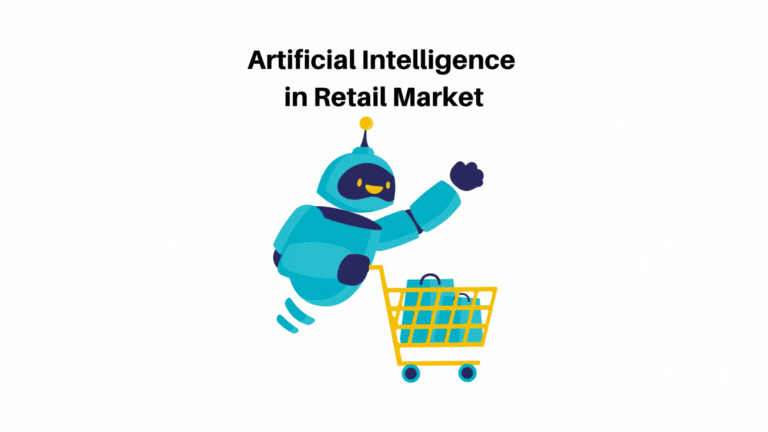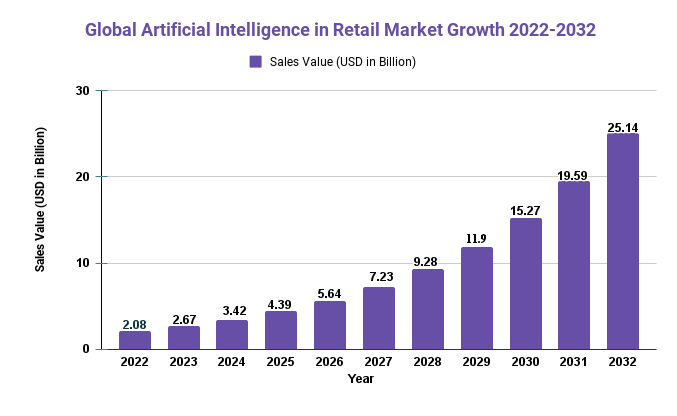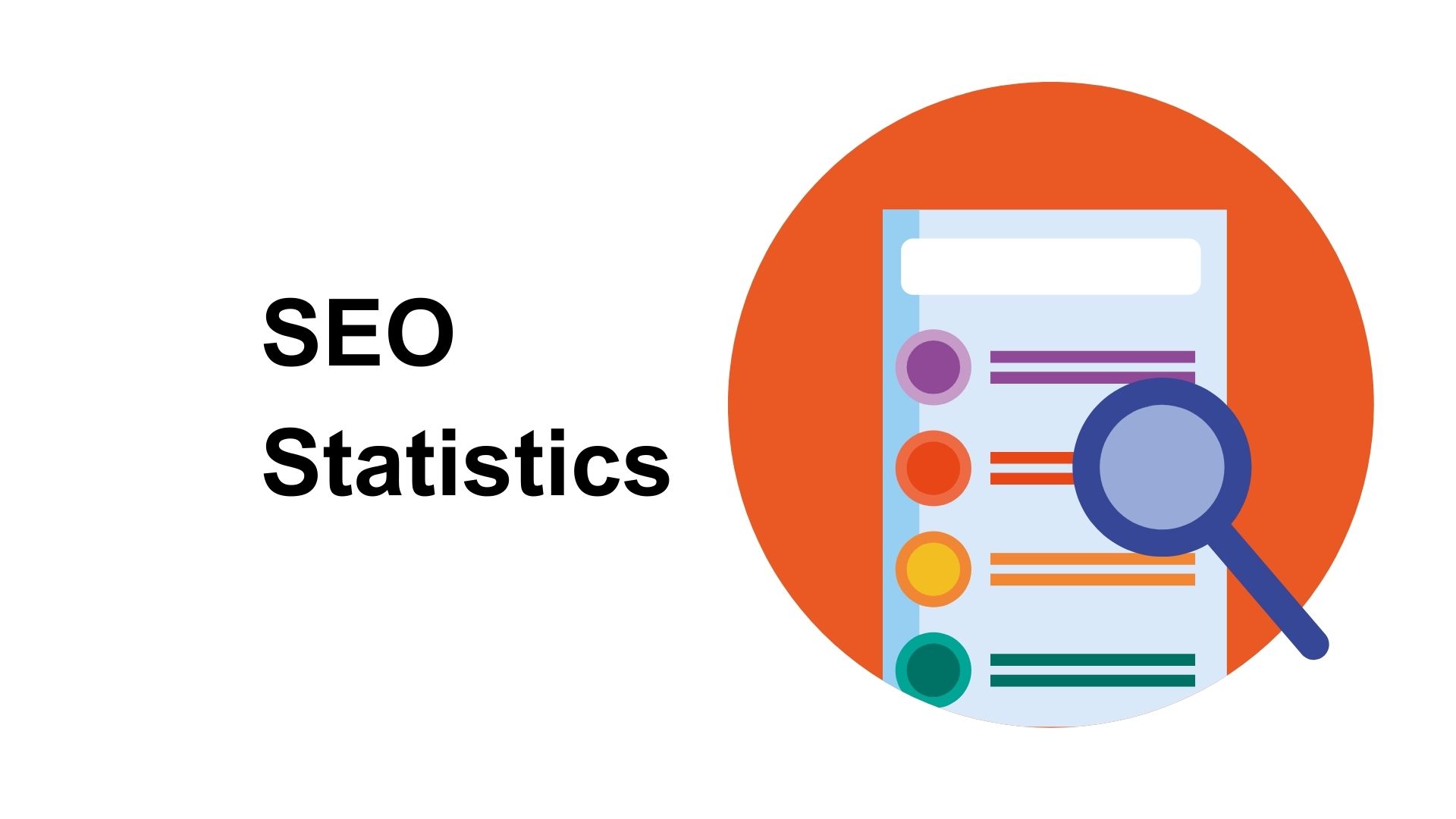Artificial Intelligence in Retail Market to Cross USD 25.14 Bn in 2032 | 28.3% CAGR

Page Contents
Artificial Intelligence in Retail Market Overview
The global artificial intelligence in retail market size is expected to reach USD 25.14 Bn by 2032 from USD 2.08 Bn in 2022, growing at a compound annual growth rate (CAGR) of 28.3% between 2022 and 2032.
The global artificial intelligence (AI) in retail market is witnessing rapid expansion due to retailers' increasing adoption of AI technologies to gain a competitive edge and streamline their operations.
The adoption of AI still faces obstacles despite the potential benefits it could have for the retail industry, including high installation costs, the requirement for qualified staff to oversee AI systems, and worries about data security and privacy. Yet, in an effort to keep one step ahead of the competition, merchants are increasingly relying on AI technologies.
Request For Sample Report Before Purchasing Here: https://market.us/report/artificial-intelligence-in-retail-market/request-sample

Key Takeaways
The demand for personalised shopping experiences, rising adoption of AI-powered solutions to optimise supply chains and inventory management, and an emerging trend of using chatbots and virtual assistants for customer engagement and support will all contribute to the rapid growth of the global artificial intelligence (AI) in retail market over the coming years.
- By 2021 to 2026, the global AI in retail market is forecast to experience a compound annual growth rate (CAGR) of more than 35%.
- Retailers' desire to reduce costs, boost efficiency, and enhance customer satisfaction is expected to lead to a surge in the demand for AI-enabled solutions for inventory management and supply chain optimization.
- The use of AI-powered chatbots and virtual assistants is expected to increase, with retailers looking to provide personalized shopping experiences, 24/7 customer support, and enhance customer engagement.
- North America is expected to dominate the global AI in retail market, followed by Europe and the Asia-Pacific region.
Interested to Procure the Data? Inquire here at : https://market.us/report/artificial-intelligence-in-retail-market/#inquiry
Regional Snapshot
- North America: Due to its quick adoption of cutting-edge technologies, increased investment in AI solutions, and the presence of major technology businesses in this region, North America is predicted to lead the global AI in retail market. One important driver fueling growth in this region is projected to be the United States.
- Europe: Europe is expected to witness significant growth in the AI in retail market due to retailers' increasing adoption of AI-powered solutions for improving customer engagement, optimizing operations and cutting costs. The UK, Germany and France are projected as being the major contributors to this region's expansion.
- Asia-Pacific: Retailers' increasing adoption of AI-powered solutions in nations such as China, India, Japan and Australia suggests the Asia-Pacific region will witness significant expansion in the AI in retail market. This expansion will be propelled by an expanding e-commerce space and a focus on improving customer experiences.
- Middle East & Africa: The Middle East & Africa region is expected to experience moderate growth in the AI in retail market due to retailers' increasing adoption of AI-powered solutions for optimization in operations and improved customer experience. UAE and Saudi Arabia are anticipated to be major contributors towards this region's expansion.
Drivers
- Retailers Seeks Tailored Customer Experiences: Retailers are increasingly turning to AI-powered solutions in order to customize their offerings according to individual customer preferences. Companies use artificial intelligence (AI) for personalized product recommendations, targeted promotions and customized shopping experiences.
- greater use of supply chain and inventory optimization solutions powered by AI: Retailers are implementing AI to improve supply chain operations, inventory management, cost reduction, and efficiency.
- Increasing use of chatbots and virtual assistants to improve customer assistance and interaction Retailers are increasingly turning to chatbots and virtual assistants as a means of delivering personalised recommendations, round-the-clock customer service, and increased engagement.
Restraints
- High implementation costs: Smaller retailers and organisations may find it difficult to embrace AI due to the significant costs involved.
- Issues of data privacy: There are significant security and privacy hazards associated with the implementation of AI technology in retail. Retailers are responsible for maintaining the security and moral treatment of the data they gather.
Opportunities
- AI-powered solutions are being adopted more widely in emerging economies: AI-powered retail solutions are being adopted more widely in developing nations like China and India. This offers the market excellent growth prospects.
- increasing use of visual search technologies backed by AI: In the retail industry, the usage of visual search technology powered by AI is growing in popularity. This offers the market excellent growth prospects.
Challenges
- Integration with Legacy Systems: Integrating AI-powered solutions with existing legacy systems can present retailers with a formidable challenge. To successfully overcome this obstacle, businesses must find ways to seamlessly incorporate their AI technologies.
- Retailers implementing AI-powered solutions must guarantee they comply with relevant laws regarding data protection, security, and ethics.
Recent Developments
- AI-Powered Visual Search Technology: Shops are progressively implementing AI-Powered Visual Search Technology, which allows users to contribute images in place of text-based searches to find products. Deep learning and computer vision algorithms are used in this process to accurately interpret images. Visual search is now available on all platforms run by companies like Pinterest, Google, and Amazon.
- Integration of AI and Voice Assistants: To enhance consumer experiences and provide individualised recommendations, retailers are using voice commands in conjunction with AI-powered voice assistants like Amazon's Alexa and Google Assistant. Customers may now use straightforward commands to search for products, receive recommendations, and make purchases.
- AI-powered customer engagement: Retailers are using AI to enhance customer engagement and support. Chatbots and virtual assistants powered by AI can provide 24/7 customer support, personalized recommendations, and seamless customer experiences.
Key Market Segments
Type
- Cloud
- On-Premises
Application
- Predictive Merchandising
- Programmatic Advertising
- Market Forecasting
- In-Store Visual Monitoring and Surveillance
- Location-Based Marketing
- Others
Key Market Players
- IBM
- Microsoft
- Nvidia
- Amazon Web Services
- Oracle
- SAP
- Intel
- Sentient Technologies
- Salesforce
- Visenze
Report Scope
| Report Attribute | Details |
| The market size value in 2022 | USD USD 2.08 Bn |
| Revenue forecast by 2032 | USD 25.14 Bn |
| Growth Rate | CAGR Of 28.3% |
| Regions Covered | North America, Europe, Asia Pacific, Latin America, and Middle East & Africa, and Rest of the World |
| Historical Years | 2017-2022 |
| Base Year | 2022 |
| Estimated Year | 2023 |
| Short-Term Projection Year | 2028 |
| Long-Term Projected Year | 2032 |
Contact us
Contact Person: Mr. Lawrence John
Market.us (Powered By Prudour Pvt. Ltd.)
Tel: +1 718 618 4351
Send Email: [email protected]
FAQ.
Some of the key players in the Global Artificial Intelligence in Retail Market include IBM, Microsoft, Nvidia, Amazon Web Services, Oracle, SAP, Intel, Google, Sentient Technologies, SalesforceVisenze.
According to a report by Market.us, the Global Artificial Intelligence in Retail Market is expected to reach USD 25.14 Bn by 2032, growing at a CAGR of 28.3% from 2022 to 2032.
Global Artificial Intelligence in Retail Market applications are Predictive Merchandising, Programmatic Advertising, Market Forecasting, In-Store Visual Monitoring and Surveillance, Location-Based Marketing.
The team behind market.us, marketresearch.biz, market.biz and more. Our purpose is to keep our customers ahead of the game with regard to the markets. They may fluctuate up or down, but we will help you to stay ahead of the curve in these market fluctuations. Our consistent growth and ability to deliver in-depth analyses and market insight has engaged genuine market players. They have faith in us to offer the data and information they require to make balanced and decisive marketing decisions.



